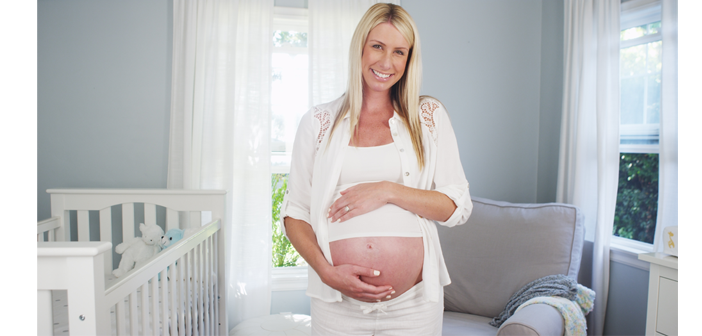For many couples, pregnancy marks the beginning of a miraculous journey. There’s a nursery to paint, a baby shower to throw and stacks of potential names to weed through. But as most mothers-to-be know, growing a little miracle inside of you isn’t always sunshine and rainbows. Often it also involves cramps, backaches and stretch marks in places you never even contemplated.
One of the most hated of all pregnancy symptoms is acne. We’re constantly told that pregnancy will give us a gorgeous, healthy glow. Instead, due to a surge in hormonal activity, many women find themselves suffering from breakouts the likes of which they haven’t experienced since their teenage years.
If this describes your situation, don’t panic — there are several simple steps you can take to prevent and treat acne. Read on to find out how to get back your pregnancy glow!
1) Explore Natural Solutions
It’s important to be ultra-aware of what you’re putting into your body during pregnancy. Before you bring out the big guns (treatments like Isotretinoin can cause birth defects) to fight your pregnancy acne, start by trying some natural solutions. Also, don’t assume all OTC products are appropriate. Read up on reviews of products like Proactiv, Clearasil and other popular ones and check with your physician before using anything you’re unsure about.
There are stacks of harmless, effective natural remedies out there, including apple cider vinegar, baking soda spot treatments and oatmeal and honey masks. For an easy fix, try coconut oil. Coconut oil is known for its antifungal and antibacterial properties. It’s also quick to absorb and will treat inflammation and redness. Apply it before bed instead of your regular moisturizer and wait for results.
2) Don’t Over Wash Your Skin
When we experience acne, often our first instinct is to wash our faces more frequently to cleanse our skin of dirt and sebum. However, over washing your face can actually strip the skin of vital natural oils and upset the PH balance. Chronic over washing can also lead to dry, cracked skin that acts like an open invitation to inflammatory skin conditions, such as eczema. No thanks!
3) Check Your Diet
Whether or not you’re experiencing pre-natal acne, it’s imperative to keep track of what you’re eating during your pregnancy. A poor diet can not only lead to complications for both mommy and baby, but can also play a part in the condition of your skin. Diets high in fat and sodium cause inflammation, which can trigger redness and breakouts. So can consuming an excess of high-glycemic foods, like white bread and potato chips.
Instead, eat a diet rich in omega-3 fatty acids, such as walnuts and fatty fish. Additionally, up your fruit and veggie uptake to get a dose of beta-carotenes, which effectively reduce your production of skin oils. If these diet changes still aren’t enough to beat your breakout, try taking probiotics daily to reduce inflammation and improve your intestinal microflora.
4) Monitor Your Makeup
Even if your makeup worked for you before your pregnancy, it may be too heavy or rich for your hormone-affected skin. Steer clear of oil-based foundations and instead opt for light, water-based facial products. Check the packaging to see whether the product claims to be noncomedogenic, as noncomedogenic formulas won’t clog your pores. Be sure to thoroughly cleanse your face to remove your makeup before bed, as makeup residue can make it difficult for your skin cells to rest and renew overnight.
5) Don’t Sweat the Small Stuff
Pregnancy acne tends to clear up soon after the baby is born. Realistically, a few months of blemishes is a small price to pay to bring a beautiful baby into the world! Pregnancy isn’t entirely bad for your skin, either. You may find that the increased circulation will give you a more radiant complexion over all, while simultaneously improving the strength and quality of your nails and hair!
Acne is a surprisingly common part of pregnancy and nothing to be ashamed of. However, if you’ve explored all these options and are still desperate to banish your breakout, your doctor or dermatologist may be able to recommend a pregnancy safe option to treat your acne.
Good luck and congratulations on your pregnancy!




